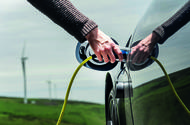Multiple chargepoints could be added to a cabinet as broadband cabling becomes surplus to requirements
Some 60,000 redundant phone and broadband-cable cabinets could bolster public EV charging infrastructure
A new pilot scheme from the BT Group has begun work to convert streetside signal boxes into electric car chargers.
Run by subsidiary Etc, the programme will soon install its first charger at a cabinet in East Lothian, Scotland.
The first phase of the pilot scheme, which will comprise a small (but unconfirmed) number of converted boxes, will be used to help BT understand how to scale an EV charging business.
It believes that it could convert around 60,000 of its 90,000 cabinets across the UK into chargers.
This would bring a significant improvement in the abundance of public chargers. According to charger-mapping service Zap-Map, there were 53,029 public chargers across the UK at the end of November 2023.
Of those, 42,941 provided charging rates of between 3kW and 22kW – typical of kerbside chargers, such as those integrated into lamp-posts.
Etc senior product manager Vishal Kaduthodil explained: “The cabinets currently provide broadband to each individual household, but they’re using old technology. They’re gonna be decommissioned as we progress full fibre [broadband] across the country.
“As they’re already connected to a power source, this reduces the need to establish a new power connection, increasing deployment speed.
“We retrofit a device to split the existing power, allowing us to continue using the existing broadband whilst now also supporting a new charge point.”
Once an area has been upgraded to fibreoptic connectivity and surplus broadband cabling is removed, the cabinets could host multiple charge connectors.
That the signal cabinets are already connected to the electrical grid is a significant advantage, compared with building a bespoke charger.
Charger operators have repeatedly raised concerns about the slow pace of getting new devices connected to the grid.
Gridserve boss Toddington Harper told Autocar last April that “almost every issue of speed of implementation is down to the speed of grid connections”.
He added that grid connections could often delay the activation of a charger by “months or more”.







